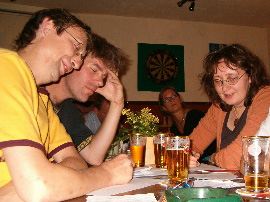Quiz bowl is a quiz-based competition that tests players on a wide variety of academic subjects. Standardized quiz bowl formats are played by lower school, middle school, high school, and university students throughout North America, Asia, Europe, Australia, and Africa.

A pub quiz is a quiz held in a pub or bar. These events are also called quiz nights, trivia nights, or bar trivia and may be held in other settings. Pub quizzes may attract customers to a pub who are not found there on other days. The pub quiz is a modern example of a pub game. Although different pub quizzes can cover a range of formats and topics, they have many features in common. The pub quiz was established in the UK in the 1970s by Burns and Porter and became part of British culture. The Great British Pub Quiz challenge is an annual event. Pub quizzes are a staple event at Irish pubs, where they are usually held in English.

A quiz is a form of game or mind sport in which players attempt to answer questions correctly about a certain or variety of subjects. Quizzes can be used as a brief assessment in education and similar fields to measure growth in knowledge, abilities, or skills. They can also be televised for entertainment purposes, often in a game show format.
Knowledge Bowl is the name for several interdisciplinary academic quiz bowl-like competitions across the United States and the world. The questions for many Knowledge Bowl competitions are supplied by the Academic Hallmarks company of Durango, Colorado.
A quiz league is an organization running quizzes on a home and away basis, usually in pubs. Like the pub quiz, it is chiefly a British phenomenon although the format has significant differences to a pub quiz due to the usual number of teams (two) and the presence of individual questions.
Bible Quiz, also known as Bible Bowl, is a competition between teams over knowledge of a pre-determined section of the Bible. Various Protestant denominations, plus a handful of independent groups, sponsor these competitions. All of them take the form of a quick-recall game, similar to those used in many American schools but instead using the Bible as the subject of study and questions. Organizations which use the name "Bible Bowl" lean toward the format established by television's College Bowl in the 1950s. All groups feature teams competing to be the first to "buzz in" using an electronic lockout device, much like those still used in TV game shows such as Jeopardy! today.

Go Go Stop is an Australian children's game show, airing on the Seven Network, and fronted by formerThe Big Arvo co-host (and current Weekend Sunrise weather presenter Jesse Tobin. Each week, three schools compete to win a weekly prize. One student from each school appears on the show daily. The program is currently on hiatus; however repeats are shown at 2:30pm on weekdays during the NSW school holidays. At the end of each week, the school with most points wins.
The International Bible Contest is a worldwide competition on the Tanakh for middle school and high school Jewish students. It is held annually in Jerusalem, on Yom Ha'atzmaut. Because the event is officially sponsored by the Israeli government and the Jewish Agency, it is attended by the Prime Minister of Israel, Minister of Education and the Chairman of the Jewish Agency.
The Quiz League of London (QLL) is a British quiz league based in London. Founded in 1990 as the Quiz League of South London, it was southern England's first independent self-administered quiz league. The matches themselves are mostly hosted at pubs or social clubs, though the COVID-19 pandemic forced the league to play its matches online. The current season (2021-22) has seen a return to matches in person.
Clash! is an American comedy game show which aired on Ha! from May 1, 1990 to March 31, 1991, and on Comedy Central from April 1 to December 28. The show was produced and hosted by Billy Kimball, and the theme song was composed by Carter Burwell.

Buzz!: Quiz TV, developed by Relentless Software and Sleepydog, is the seventh game in the Buzz! series of quiz games and the first to appear on the PlayStation 3 console. It debuts new wireless Buzz! controllers, as well as new game rounds. It is the first Buzz! game to feature user created content and online play. Buzz! Quiz TV was one of the first games to support the PlayStation 3 trophy system, and the first online game to support the feature. The game is available in a game only (Solus) version or in a bundle which includes 4 of the new wireless Buzz! Buzzers, a USB dongle for wireless connectivity.
The Brain Game is a weekly quiz bowl show for high school students that airs on NBC-affiliate WTHR-13 in Indianapolis, Indiana. Originally called Exercise in Knowledge when introduced in 1972, the Brain Game is currently broadcast at 7 pm on Saturdays, and is hosted by WTHR morning meteorologist Chuck Lofton. It is sponsored by Westfield Insurance, which also sponsors four other high school quiz shows. The show is filmed at the WTHR studios on Meridian Street in Indianapolis. The Brain Game has been filmed in HD since 2008.
The European Quizzing Championships (EQC) are an annual multi-disciplinary quiz event, in which representatives from various countries compete as individuals, in pairs, and/or in teams.
Are You an Egghead? is a BBC quiz show that was presented by Dermot Murnaghan. It is a spin-off from the quiz show Eggheads, with its goal to find a further Egghead to complement the existing team. The first series was aired weekdays from 20 October to 2 December 2008 and was won by Barry Simmons. The second and final series was aired from 12 October to 23 November 2009 and was won by Pat Gibson. A similar show, Make Me an Egghead, aired in 2016.

BEZZERWIZZER is a trivia game combining trivia, tactics and trickery. The game was invented in 2005 by the Dane Jesper Bülow.

Fifteen to One is a British general knowledge quiz show broadcast on Channel 4. It originally ran from 11 January 1988 to 19 December 2003 and had a reputation for being one of the toughest quizzes on TV. Throughout the show's original run, it was presented and produced by William G. Stewart. Thousands of contestants appeared on the programme, which had very little of the chatting between host and contestants that is often a feature of other television quiz shows.

Pointless is a British television quiz show produced by Banijay subsidiary Remarkable Television for the BBC. It is hosted by Alexander Armstrong with assistance from Richard Osman. In each episode four teams of two contestants attempt to find correct but obscure answers to four rounds of general knowledge questions, with the winning team eligible to compete for the show's cash jackpot. All questions used on the show are factual in nature, and are asked of a panel of 100 individuals in a pre-conducted public survey. A correct answer scores one point for each survey subject who gave it, and the objective is to achieve as low a score as possible. "Pointless" answers, correct responses that were not given by anyone surveyed, score zero points and are the most desirable. Every pointless answer given during the main game increases the jackpot by £250, and the team that reaches the final round has three chances to win it by giving one such answer.
The 3rd Degree is a British quiz show broadcast on BBC Radio 4, hosted by comedian Steve Punt and made by Pozzitive Television. The series is recorded at different universities around the country, the contestants all coming from the university in which the recording takes place. One teams consists of three students and the other of three lecturers who teach the subjects the students are studying.
Make Me an Egghead is a British quiz show on BBC Two presented by Jeremy Vine. It was a spin-off from Eggheads with the goal to find two further Eggheads, one male and one female, to complement the existing team of seven. It ran from 22 August to 23 September 2016 and was won by Steve Cooke and Beth Webster. A similar show, Are You an Egghead?, aired in 2008 and 2009.

Master Minds is an American game show airing on the Game Show Network. The show debuted on June 10, 2019, under the title Best Ever Trivia Show, hosted by Sherri Shepherd and regularly featuring Ken Jennings, Muffy Marracco, Jonathan Corbblah, Arianna Haut, and Ryan Chaffee. A first season with the show retitled Master Minds debuted on April 6, 2020, hosted by Brooke Burns.







